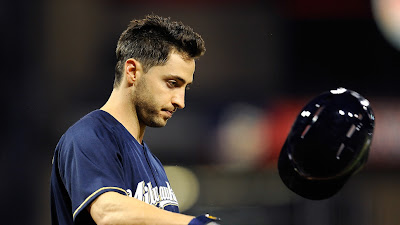SPORT / Dave Zirin : Decriminalize Baseball!
 |
| Ryan Braun isn't Al Capone. Image from Deadspin. |
A solution to baseball’s drug wars
I love baseball and it’s tragic to watch it self-devour.By Dave Zirin / The Rag Blog / June 5, 2013
See Thorne Dreyer's articles about progressive sportswriter Dave Zirin at The Rag Blog, and at Truthout, and listen to our March 22, 2013, Rag Radio interview with Zirin.If you want to know what’s wrong with Major League Baseball, look no further than today's top headlines. Described as “the largest [Performance Enhancing Drug scandal] in American sports history,” at least 20 Major League Baseball players now face significant suspensions for PED use.
Included in the guilty-until-proven-innocent public parade are Yankee albatross Alex Rodriguez and the man Buster Olney is calling “the Lance Armstrong of baseball," Milwaukee Brewers star Ryan Braun. [The latter is in reference to Braun’s Shermanesque denials over the last two years that he ever imbibed in pharmaceutical help, not his ability to master the Pyrenees.]
MLB has leaked the names of the accused because they have confidence in their source. His name is Anthony “Tony” Bosch and he is the former director of Biogenesis, a now shuttered South Florida “anti-aging clinic." Tony Bosch is not a doctor nor does he play one on TV. He did, however, have a roster of “patients” whom he allegedly supplied with all manner of banned substances.
MLB was in the process of suing Biogensis when the near-bankrupt Bosch, unable to afford a proper legal defense, chose to turn over every scrawled receipt, hand-written ledger, and appointment book to MLB officials. In return, they have reportedly pledged to stop their civil suit and use their political clout to halt the Justice Department’s forthcoming criminal indictment.
Forget your personal feelings about whether you like or dislike A-Rod or whether you think these players are worse than Pol Pot for “cheating the game.” Forget if you're convinced there is no greater evil than a pill that helps an adult professional athlete heal from injuries or work out with greater efficiency.
Forget it all and consider the disturbing audacity of what Major League Baseball just accomplished: a powerful private corporation has used its political connections with the Justice Department as well as the power of its own purse to squeeze a weaker business to disclose confidential medical records. America!
If that doesn’t bother you, perhaps this will. According to Major League Baseball’s collective bargaining agreement with the players' union, the league can impose a 50-game suspension for a first PED offense, 100 games for a second offense, and a lifetime ban for a third.
In this case, according to sources, the league will be pursuing 100 game suspensions for every player deemed guilty on the basis that it’s really two offenses in one. Their mere connection to Bosch is one strike, and any previous denial that they were connected to Bosch -- in other words lying to MLB officials -- constitutes a second.
Yes, you don’t even have to fail a drug test. You just need to be around drugs and make statements that Commissioner Bud Selig unilaterally determines to be a lie. It’s like a kid’s baseball book co-written by Mike Lupica and George Orwell.
 |
| Tony Bosch. |
This is not an earthquake. Instead it will be death by 10,000 paper cuts. The union will protest the idea that there could ever be two suspensions for one offense and appeals will drag on for years. The only thing “rattling” in future generations will be the skeletons of what once comprised the fan base of this sport.
I love baseball and it’s tragic to watch it self-devour, so here is my own humble advice about a different way to handle this. Steroids and all PEDs need to be seen as an issue of public health, not crime and punishment. If seen as an issue of public health, the scandal here would not be that a group of players may have used PEDs. The scandal would be that they had to visit a skuzzy, unregulated “clinic” not run by medical professionals to get their drugs.
Instead of criminalization, educate all players about the harmful effects of long-term PED use when not under a doctor’s supervision. Have medical officials make the policy and determine what PEDs help a person heal faster -- an admirable quality in a medicine, no? -- and what shouldn't be a part of any training regimen. Centralize distribution under the umbrella of MLB so it doesn’t become an arms race of which teams get the best doctors and the best drugs.
Then, players could take advantage of the most effective new medicines and MLB would be removing the process out of the shadows where the Tony Bosch types of the world hold sway. They also then have an ethical basis for testing and rehabilitation when use crosses the line into abuse.
This solution won’t please the purists who revere a game that never existed. It won’t please the anti-steroid furies who think that the behavior of children is determined in Pavlovian fashion by the actions of Major League Baseball players. It certainly won’t please baseball’s owners who like a system where fleecing cities out of millions in tax money isn’t cheating but taking a pill to work out longer is.
It would however finally at long last take the game out of the courts, off of the front pages, and put it back on the field. Bud Selig isn’t Eliot Ness and Ryan Braun isn’t Al Capone. It’s time to stop the madness and decriminalize the game.
This article was also posted to The Nation blog.
[Dave Zirin is sports editor at The Nation and the author of the new book, Game Over: How Politics Has Turned the Sports World Upside Down (The New Press). Contact him at edgeofsports@gmail.com. Read more articles by Dave Zirin on The Rag Blog.]
The Rag Blog






















